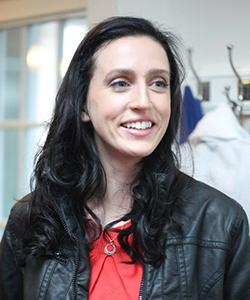Meet Kate Oliver

Degree: BS Psychology ’20
Research Interests: Mood and personality disorders; juvenile justice
Co-ops: Clinical Research Assistant and Co-op Supervisor, University of Pennsylvania’s Mood & Anxiety Disorder Treatment and Research Program
Extracurricular activities: Psi Chi Member; Psi Chi Mentorship; Juvenile Justice Research & Reform Lab
Awards: Undergraduate Honors Award
What has made your experience at Drexel special or unique?
My initial connections with faculty opened opportunities for me to network in unexpected places, become part of a remarkable lab, and establish a mentorship program all my own. My autonomy grew quickly, and I found myself increasingly involved in supervisory roles with the privilege of leading others. Drexel met each of my successes with a new, enriching challenge and I realized: here, your only limits are the limits you choose.
What were some of your most memorable travel experiences through Drexel?
I went with my forensic psychology lab to Argentina, where we went on guided tours through a psychiatric hospital, a psychiatric prison, and parliament, discussing mental health care and the justice system’s approach to mental illness there. We also studied extensively with Dr. Jorge Folino and Dr. Ely Leon Mayer on forensic mental health assessments in Argentina and Chile, and the intersection between ethics, legal and mental health priorities.
The trip was an extraordinary experience that deepened my understanding of a very different culture and by comparison, our own as well. Their collectivist society contrasts sharply with our individualistic philosophies and values. I returned home not only more educated about critical affairs in medicine and law abroad, but also more certain of the kind of contributions I want to make, personally and academically, to my own community.
How was your co-op experience?
My co-op was a clinical research role at the University of Pennsylvania’s Mood & Anxiety Disorder Treatment and Research Program. With aspirations of a counseling career, I was surprised to learn patient contact was possible for my co-op. I assumed that without licensure, I would be stuck with administrative work, but Penn carefully structured the position to support the mutual goals of their office and those of a passionate undergraduate student looking for experience.
My work there reinforced my passion for counseling and challenged me in the world of research. The position also allowed for a great deal of independence, which enabled me to improve existing data management models and create new ones — including by developing a new co-op position to augment growing research needs. Soon enough, I was hired as the co-op supervisor!
What motivates you?
Other people: students who inspire and professors whom I respect; the shared value of knowledge for knowledge sake, and an unending drive to connect with others for positive change.
What is one thing a faculty member has told you – or a particular course/lesson – that has stuck with you?
Dr. Karol Osipowicz pushes us to think in new directions. Classes with him have encouraged me to investigate well outside a typically psychoanalytical perspective and consequently engage with other departments and expand my capabilities. Critically, I’ve learned from him how to ask piercing, driven questions that enrich and inform my analyses with greater efficiency.
Equally impactful, my academic adviser, Devon Thomas, once diffused a mountain of stress with simplicity and compassion in saying: “You’re not alone.” She helped me take root in my strengths, now unshakable.
What advice do you have for a high school student looking for an undergraduate program?
Knowing you don’t know what you want is a great place to start, and might be the best place. People with just an idea of what they want often gain the most from their undergraduate experience. Go to class – all of them. Get involved; all it takes is effort and yours is unique. Appreciate others’ time as well as your own. Stress management has a steep learning curve, but it’s forever rewarding. Most of all: You are already powerful and capable. Show off your best! It’s yours alone to give.